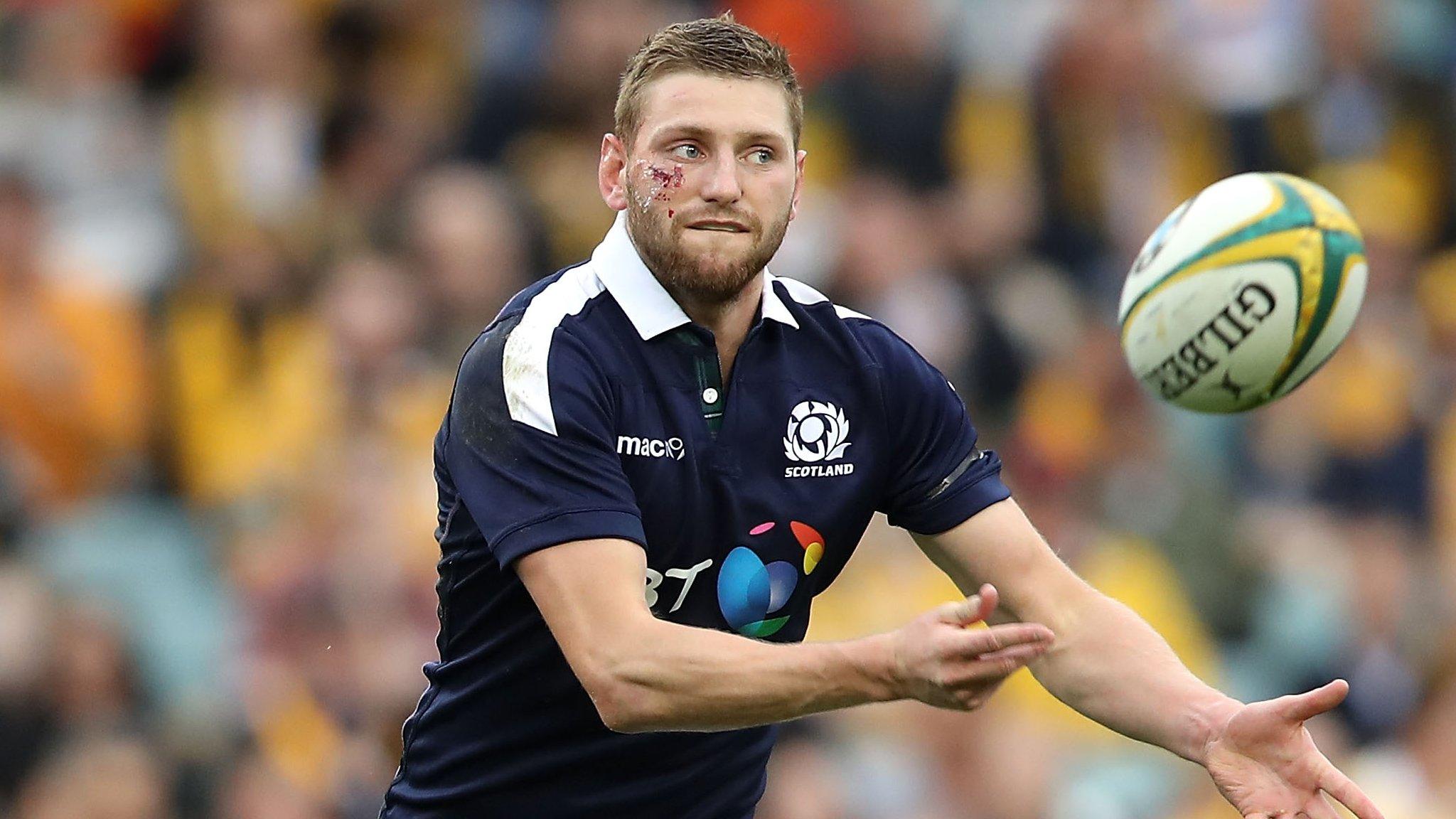Australia 19-24 Scotland: Heady times for Scots after Sydney win
- Published
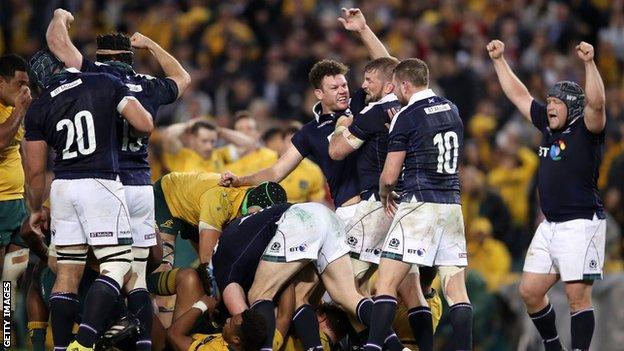
Scotland secured a second successive win on Australian soil
On a day of days in Sydney when so many individual battles were fought and one collective battle was won, there was still a rivalry, of a sort, taking place an hour after the final whistle.
In the Mr Angry competition there were many contenders, all wearing Wallaby gold.
There was Michael Cheika, the head coach, with a face like thunder in the press conference in the gym at the Allianz Stadium. Alongside him there was the captain, Michael Hooper, who looked like he was prepared to burst the first man who looked at him sideways. Out in the corridor, shortly after, there was the scrum-half, Will Genia, systematically dismantling himself for the errors he'd made that contributed to two of Scotland's tries.
Cheika was asked by a Scottish reporter if he'd been surprised by what the underdogs had delivered out there. The Australian didn't like the inference.
"The only people who are saying that Scotland aren't up to it is the Scottish media," he responded. "You keep putting yourself down and maybe it's so you can get up for the game.
"We think Scotland are a top team. We never said anything about that. You guys say it and then you perpetrate the story back through us somehow. I don't see our media doing that."
He over-egged things a little. The Scottish media hasn't put anybody down, but one thing is true - few were prepared to believe that a Scotland shorn of Stuart Hogg, Sean Maitland, Huw Jones, Tim Visser, Greig Laidlaw and more could go to Australia and win.
There is great excitement about what this team can achieve but there's also some reluctance to shout about it. Many times before people have been wounded while hailing a new era. At various points in the past 17 years we've all run to the light at the end of the tunnel only to get mown down by an oncoming train.
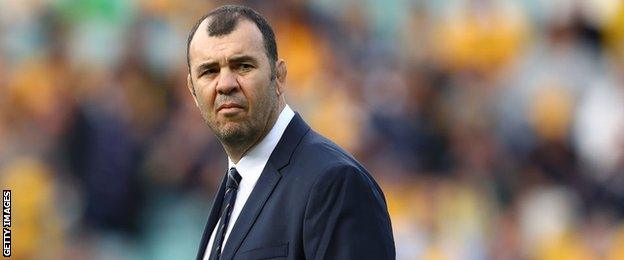
Cheika insists Australia did not underestimate Scotland
Belief - true belief - drops slowly. And this was another stage in the process.
The sincerity of Australia's respect for Gregor Townsend's team was beyond question, both before the Test and after it. Cheika and the rest didn't just talk hackneyed cliches about Scotland's pride and passion, they talked specifics.
Genia had a monologue about how damn difficult it had been for him to dig the ball out of the breakdown for much of the game. In his voice there was nothing but admiration for the way the Scots had denied them the fast ball they need to play the game they want to play.
Scotland's work on the floor was excellent and the scale of their defence for the last 20 minutes of the Test was vast. It's only on repeated viewings do you get a full appreciation of what they achieved in successfully defending their lead.
That's the point, though. They had a lead - a handsome five-pointer - and how they built it was an area raised by captain John Barclay in the aftermath.
Proud day for Scotland, says Townsend
In getting themselves into a winning position Scotland produced some class. The opening try, for Duncan Taylor, was the product of a poor Genia pass followed by another poor pass by Tatafu Polota-Nau. It's too easy to say that the try was all down to Aussie blunders.
Polota-Nau shipped the ball hastily because he was under heavy pressure from Ryan Wilson. The ball didn't reach the hands of its target, Dane Haylett-Petty because Taylor was so quick in his thinking. He screeched in unnoticed by Polota-Nau and Haylett-Petty. The wing still had his arms cupped waiting for the ball - like a wicketkeeper at the stumps - while Taylor ran away to score.
Wallaby errors, sure, but errors committed under stress and then capitalised on ruthlessly.
Scotland's second try was another illustration of awareness. Fly-half Finn Russell - since called up by the British and Irish Lions - was outrageously good on Saturday, in attack and defence. He made 13 tackles, got hit late a number of times and took an elbow in the face that opened up an old wound under his eye, but smiled his way through it.
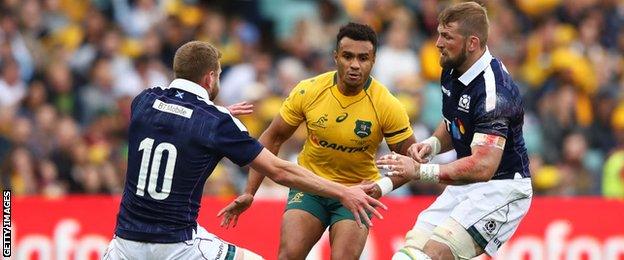
Genia (centre) had a frustrating day in Sydney
His charge down of Genia wasn't a fluke. Genia's fly-half, Bernard Foley, was in the sin bin at this point. Genia had to take that kick on. He'd been charged down against Fiji the week before and maybe Russell remembered that. Whatever, he sized things up and made the play - and scored. Poor from Genia, yes. But Russell's part was no fluke.
Those two scores were the aperitif, the third being the main course. Setting the scene here; Australia had just gone from 17-7 down to 19-17 ahead, 12 unanswered points that had filled them and their supporters with confidence. An hour had been played and Scotland looked in trouble.
From there they produced a try that can stand proudly alongside any they've ever scored, maybe not in significance terms - Jim Calder and Tony Stanger are immovable in the pantheon - but in terms of pure quality, this was special.
When Ali Price collected the ball at the back of a breakdown between his 22 and his 10m line the clock showed that 60 minutes and 20 seconds had been played. In the next 48 seconds, 11 different Scottish players handled - some more than once - with Hamish Watson finishing it off at the end.
There was so much content in it, so many fine moments as Scotland moved Australia right, then left in search of weakness. Russell's excellent offload under pressure just short of halfway, Ross Ford's carry, Matt Scott's carry in his wake, Jonny Gray recycling despite being whacked by Wallaby second-row Adam Coleman. "Hammer-time!" called the commentator on Australian television.
Well, not really. On the Scots went. Russell teasing the defence, a Scottish dummy runner taking a Wallaby with him, the attack sweeping to the right. Taylor kept it moving, brushing off a hit from Tevita Kuridrani in midfield. Kuridrani stayed on the deck and out of the game. Taylor ran on, as alive as can be.
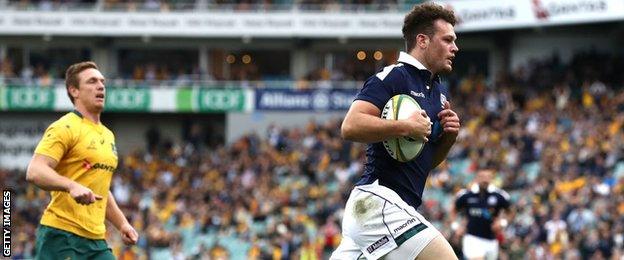
Taylor crossed first for the Scots against the Wallabies
Lee Jones got it on the touchline. The Australians were in bother now - and they knew it. In trying to halt the move, Reece Hodge and Haylett-Petty collided and crashed to the ground. Jones hurdled them.
Freeze the picture right there and here is what it looks like. Jones has the ball and has Taylor, Watson and Alex Dunbar outside. Four Scots against one defender, Genia. That image is a beauty because it encapsulates everything that is good about this team - mate supporting mate, everybody working hard to be where they need to be.
Jones gives it to Taylor and in that moment, with Israel Folau now tracking him, Taylor is the coolest man in the stadium. He slows his run, draws Folau to him and pops it to Watson. Try.
That's what Barclay was talking about. The win wasn't just hewn from rock-like defence and the game-securing turnover from Dunbar at the death. At the heart of it was brilliance as much as belligerence.
Scottish rugby fans don't need to be told to keep their feet on the ground. Given the horrors from 2000 and beyond they couldn't be any more grounded if they were cutting about in concrete boots. There's excitement, though, about what can be achieved under Townsend, following on from the foundations put in place by predecessor Vern Cotter.
A major problem going back years was a chronic lack of creativity and a desperate shortage of depth. The former has now been turned on its head, the latter is getting there.
You could pick a very decent side from the players who didn't start in Sydney. Some appeared off the bench, but most weren't even in the country on Saturday - Hogg, Maitland, Jones, Matt Scott (or Mark Bennett), Visser (or Damien Hoyland), Peter Horne and Laidlaw (or Henry Pyrgos) in the backs and a forward pack of Alasdair Dickinson (or Allan Dell/Rory Sutherland), Ford and WP Nel, Richie Gray and Tim Swinson, Rob Harley, John Hardie and Josh Strauss.
Summer Tests are not the true testing ground; championship rugby is. But the summer gives clues as to what's coming next and in Scotland's case there is a growing sense that something sustainable is happening. Heady times, these.
- Published17 June 2017
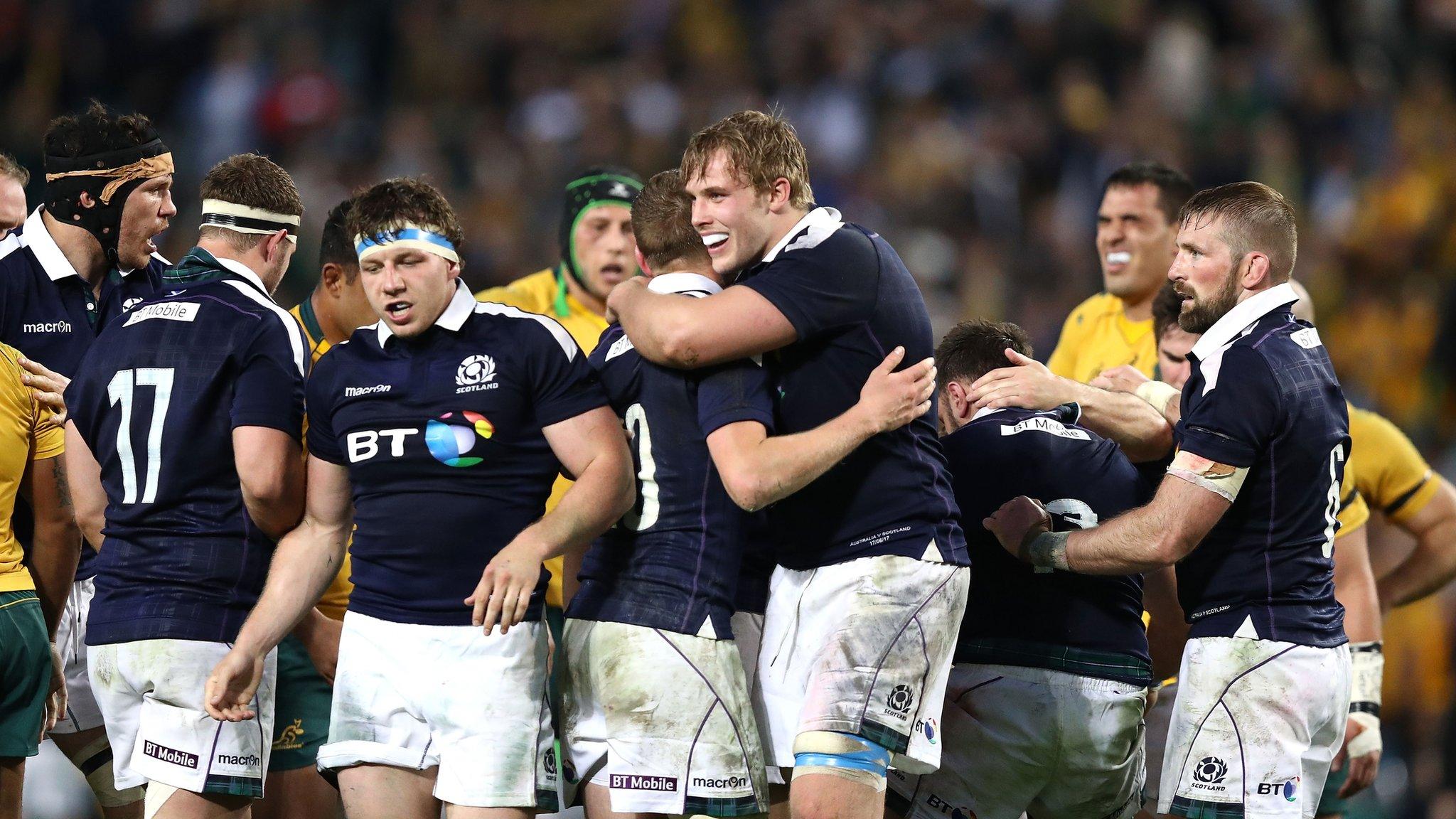
- Published17 June 2017
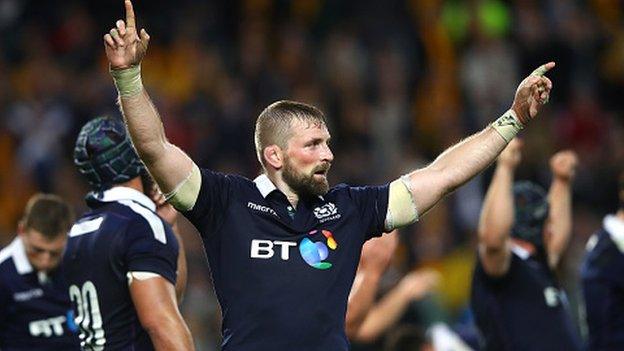
- Published17 June 2017
